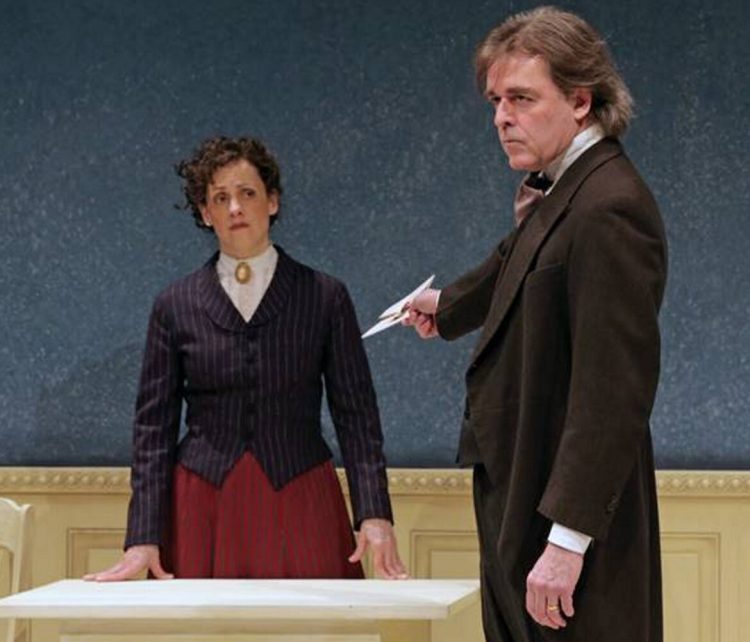Good Theater’s latest production is the Portland premiere of a play that imaginatively seeks to further the conversation started by Henrik Ibsen’s classic “A Doll’s House.” While engaging on a serious level, “A Doll’s House, Part 2” also has just a bit of fun with itself, making for a rich theatrical experience overall.
Lucas Hnath has created a 90-minute work that freshly addresses topics of gender and economic inequality left hanging in the air, in a sense, by Ibsen. The language gets salty at times, as the original characters are given contemporary voices, but the new play insightfully hits on issues that still very much resonate.
Nora, the middle-class wife and mother of “A Doll’s House” is back in Part 2, after having generated controversy and heartbreak by abandoning her domestic life 15 years earlier. She’s gone on to do surprisingly well as a writer but has encountered a legal hitch that forces her to reengage with those she left behind.
Abigail Killeen takes the lead role and presents a pacing and prancing Nora who has become a “very different person” since learning that her marriage had been a “process of self-torture.” Killeen conveys her character’s pride as she articulates her reasons for leaving. Her immodest postures and assertive gestures melt away somewhat over time as her Nora’s vulnerabilities emerge.
Local theater stalwart James Noel Hoban plays Torvold (aka Torvald), her estranged husband who has never gotten over her departure and tries to let her know why to the extent he understands. Hoban reduces his character’s strengths to admitted weaknesses while perhaps gaining some sympathy along the way. After enduring both physical and emotional blows, will he be left alone again at the close?
Another local favorite, Maureen Butler, gives an excellent performance as the long-suffering nanny/maid Anne Marie. The personal price her character has paid becomes palpable as her employers lay out their intellectual and emotional arguments. Her shocked and bemused reactions to the others are a hilarious show in themselves.
Hannah Daly completes the cast as Nora and Torvold’s daughter, Emmy, a feisty sort who reveals she has some of her mother’s independent streak while, in a twist, defending traditional values of marriage and family. Daly gives her lines life.
There is much to think, talk and laugh about in this unusual play. Graced with a fine cast, director Steve Underwood (who also designed the austere but appropriately confining set) has kept to the balance called for by Hnath’s copious dialogue and made it all come together.
Steve Feeney is a freelance writer who lives in Portland.
Send questions/comments to the editors.



Comments are no longer available on this story